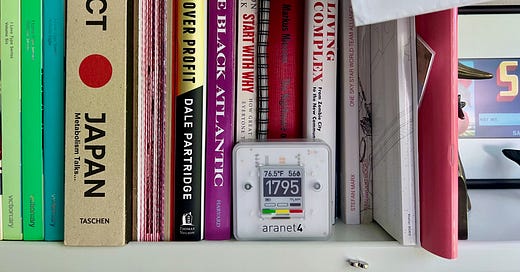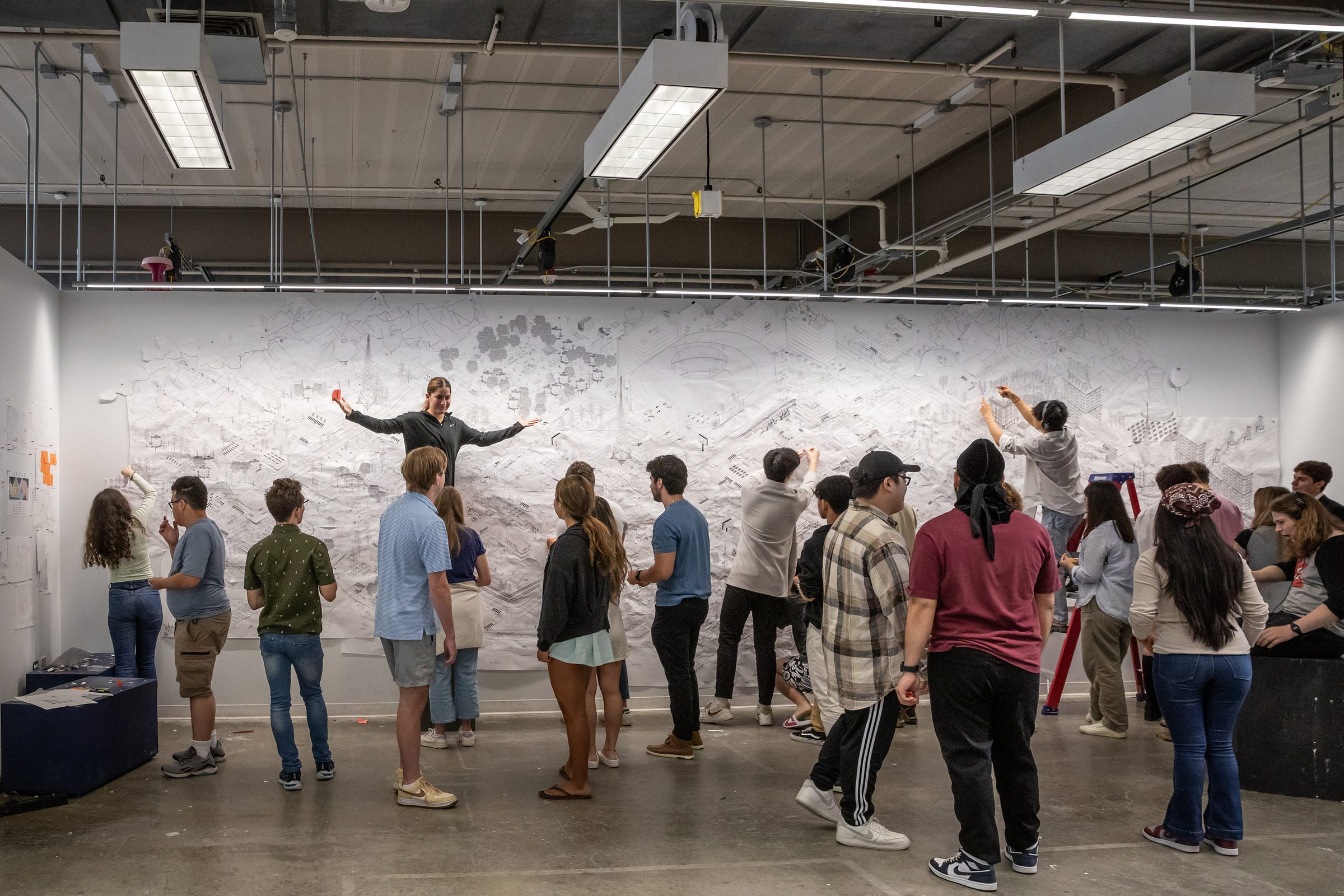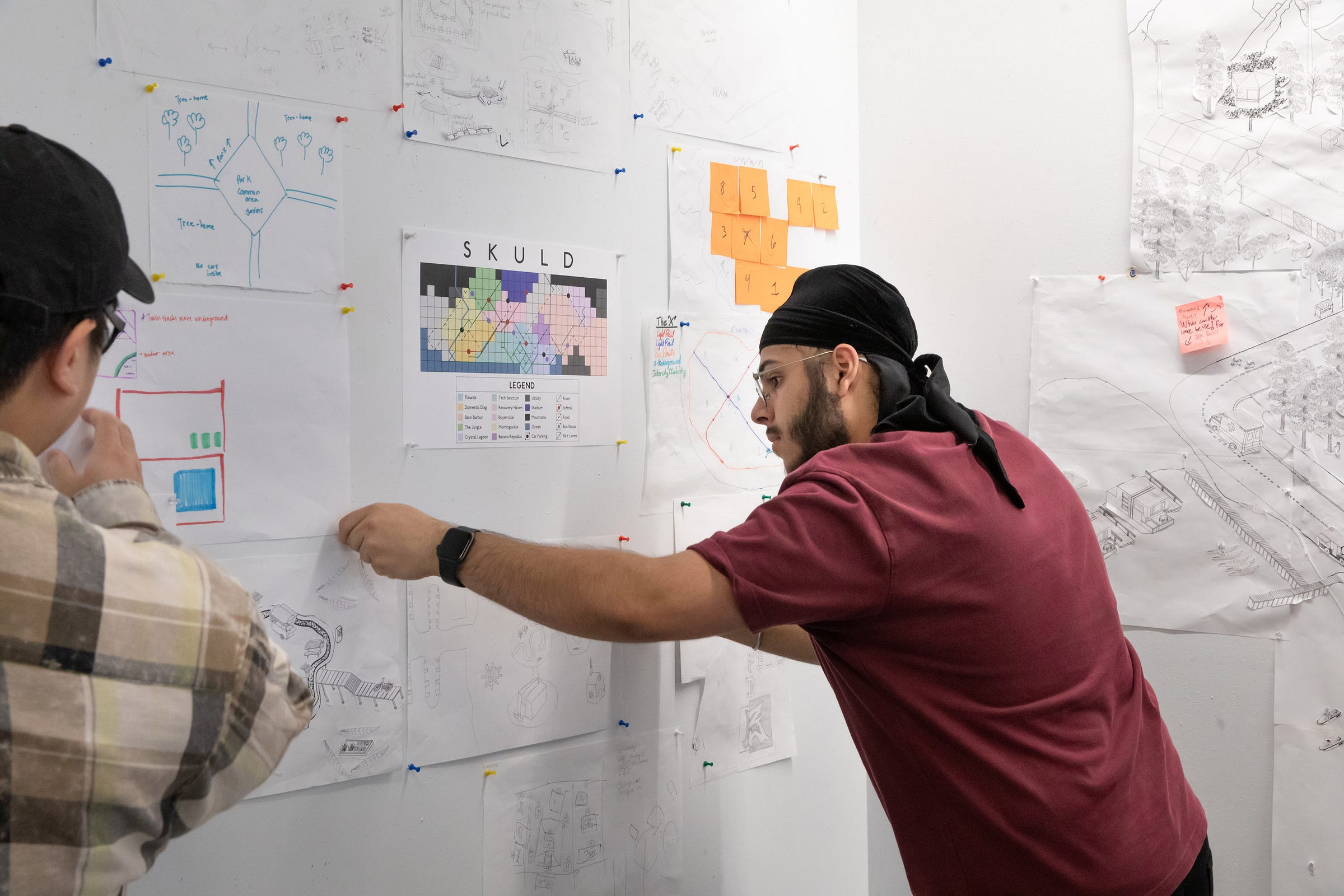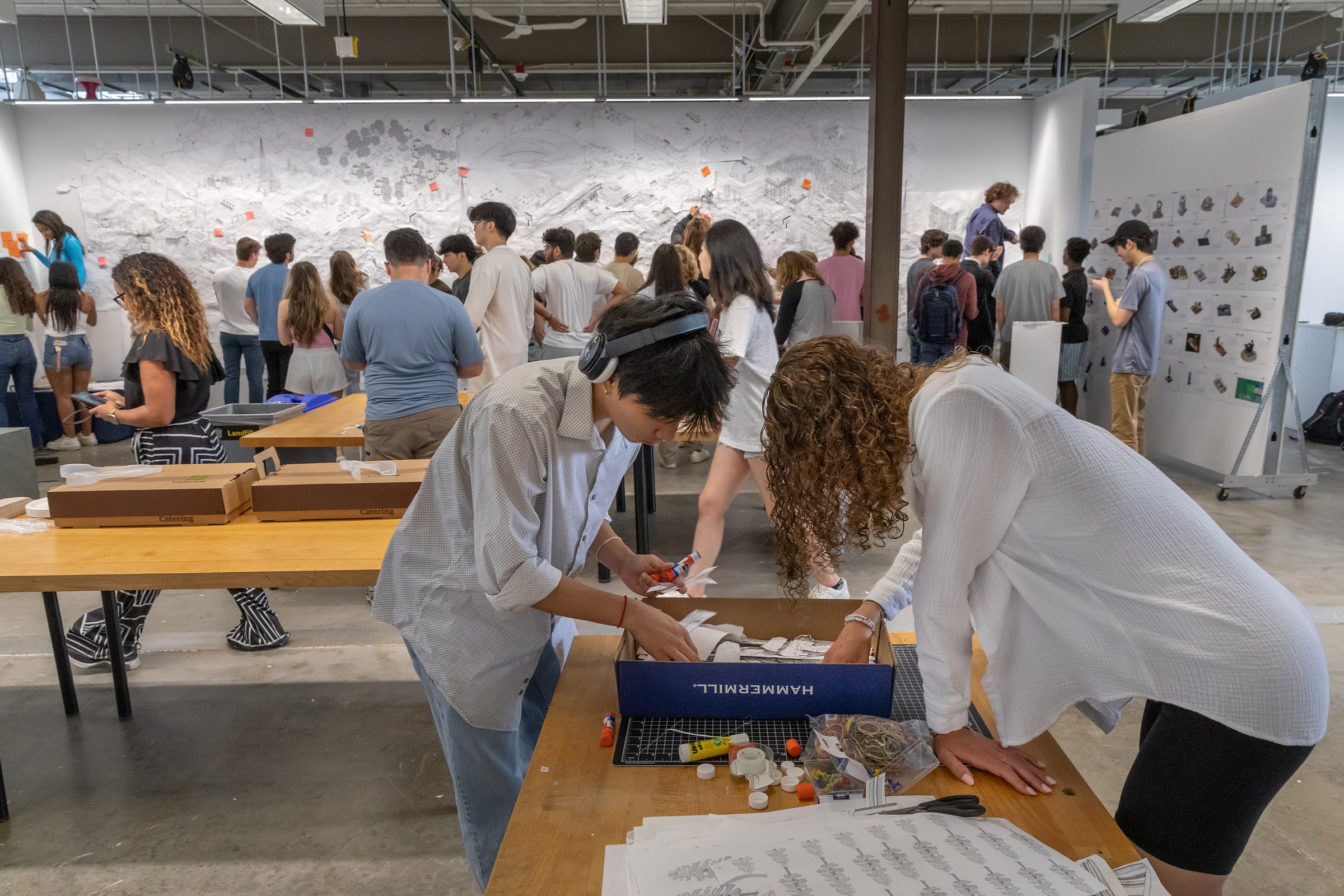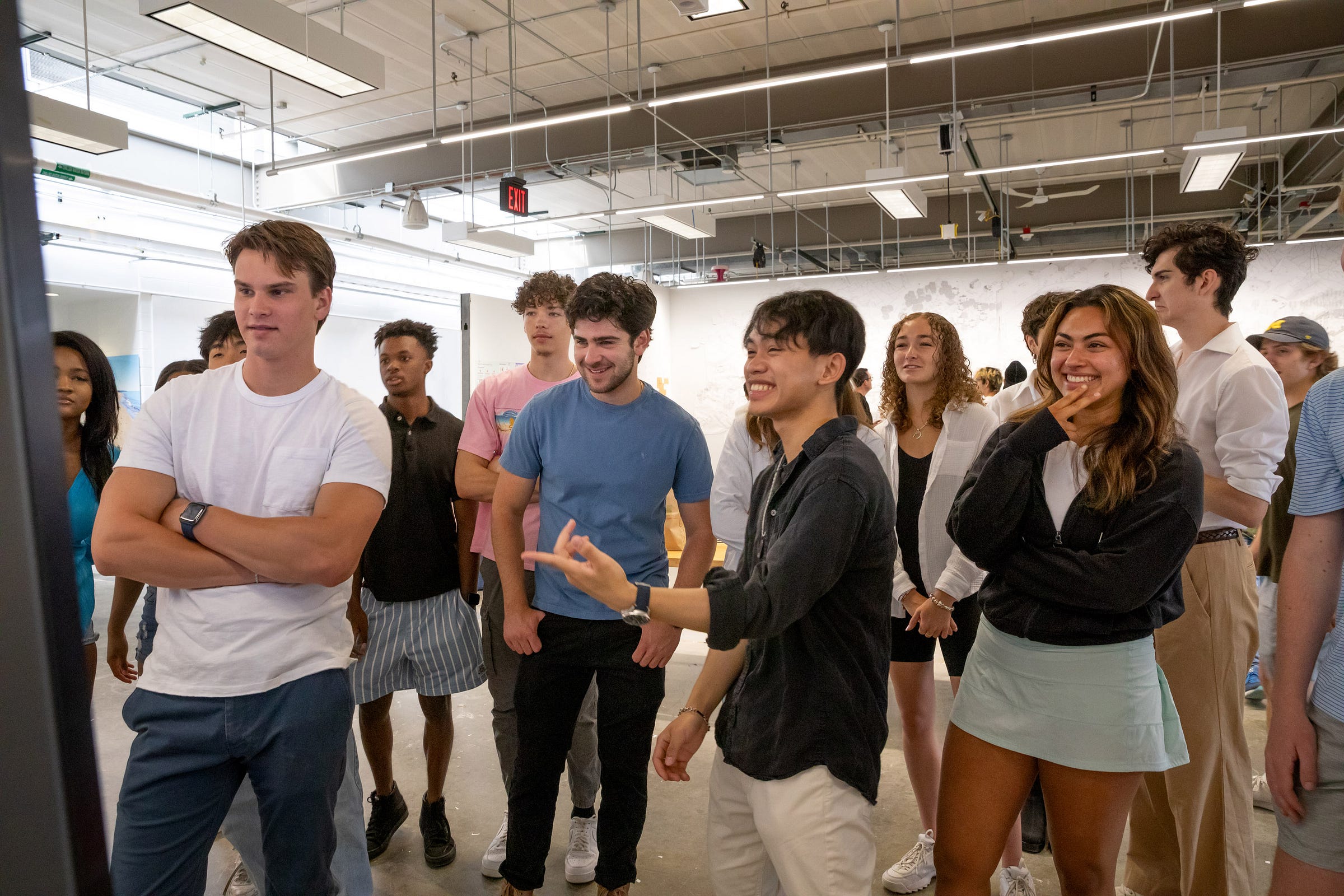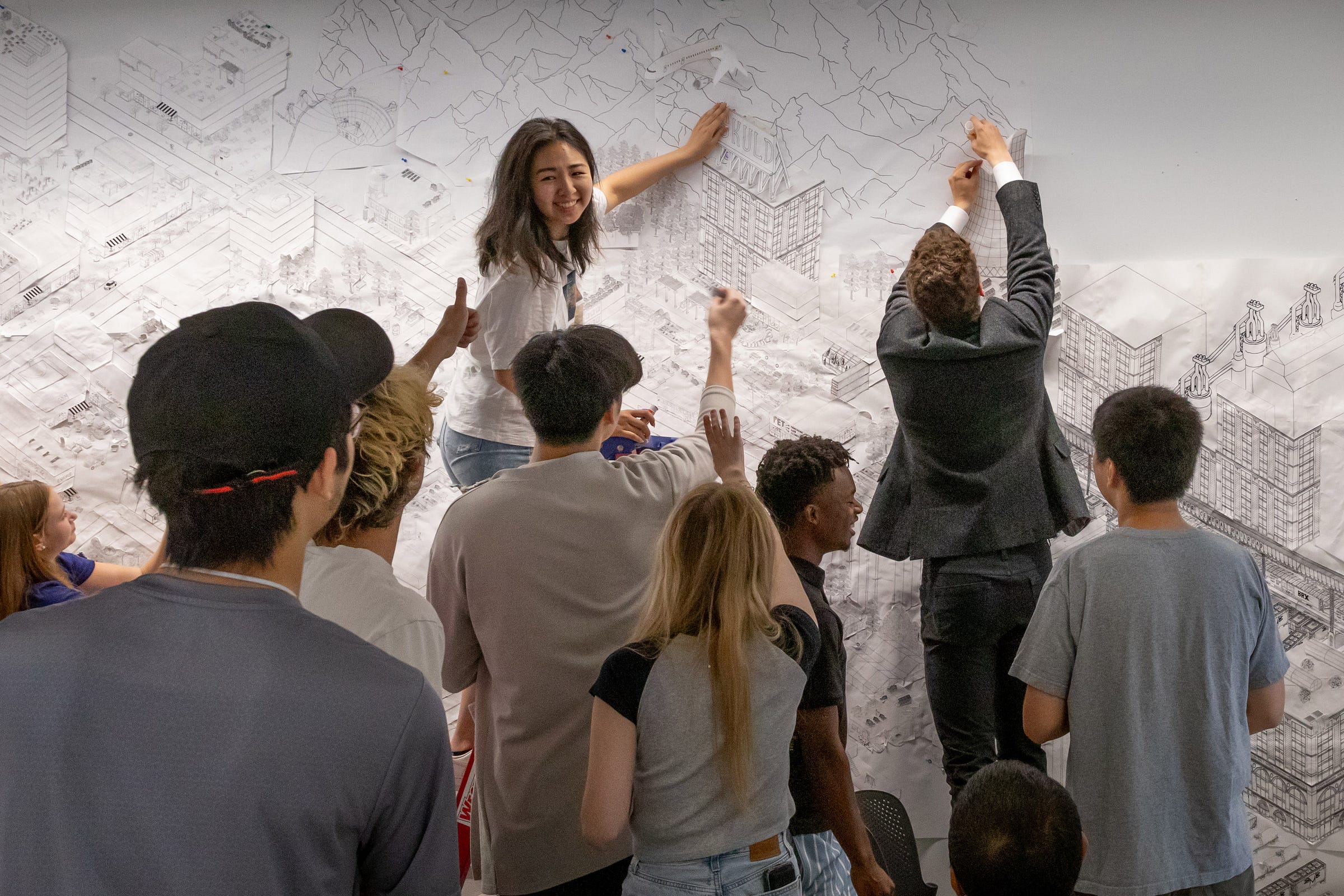Hello from AQI 300+, downtown Detroit in June 2023. With winds pushing Canadian wildfires smoke southwards, low key urban tech is front and center in daily rituals here: searching the web for the latest air quality readings, looking at air quality monitors in the home, and wondering is it really not possible to zap smoke from the sky with lasers?

In our last update before taking a break till September we’re posting a letter to the first year students about sharing and what it means in urban technology and spaces, inspired by the work that I saw during the final discussion for their course Incomplete City. That class culminated in an impressive 40ft wide hand-drawn mural depicting the metropolis of Skuld, a product of the student’s minds working with their instructor Torri Smith.
The exercise, which we do every year, is one of urban design and simulated urban negotiations. It’s also a chance to invent whatever kind of place the students decide to create, which is why I was surprised when I attended the final discussion and found that parking features prominently. Is this the future that 18yr-olds want to occupy? There’s more to the story. In discussions with students it became clear that they felt somehow tied to the status quo, thus parking and cars ate their city just as it has eaten many others (a theme we’ve dwelt on before).
My son Fred, age 30 months, asks each night for a “song about sharing” to which I usually respond with a made up diddy about sharing grapes, toys, or the playground. That Fred is amused by sharing is heartwarming, even if it is a randomly chosen topic that will be replaced by another fascination next week. At home and in the classroom, sharing is the theme of the summer, and also that of a letter included below to the citizens of the Incomplete City, our budding urbanists heading into their first college summer.
💬 Hello! This is the newsletter of the Urban Technology program at University of Michigan, in which we explore the ways that data, connectivity, computation, and automation can be harnessed to nurture and improve human life in cities. If you’re new here, try this short video of current students describing urban technology in their own words.
🌁 Letter to the Citizens of the Incomplete City
The primary thing to say is that you should be proud of yourselves for completing your first year of college, and proud collectively that you’ve made it though the incomplete city. We close the first year with this exercise because it centers the most important technology of cities: sharing.
The incomplete city (like all others) is impossible to build alone, though sometimes people try. In the making and remaking of your imagined villages, then towns, then unified city, the game is to protect only what you must and to share the rest by default. Cities exist for sharing beyond your tribe.
When urban life works well, the outcome is described as “urbane”, which implies a courteousness and cultivated nature, something elevated above the norm. On a superficial level, urbane life is punctuated by smiles shared between strangers. On a more meaningful level though, urbane existence is the common weathering of the unexpected. When we struggle to breathe in a city blanketed by wildfire smoke, it’s not the bricks and mortar of the city that will save you but the openness of strangers to collaborating on things bigger than themselves. To consciously use less energy or eat local food is to share an understanding of planetary relationships so deeply that you change your behavior on the faith that others will do the same, and that you may collectively enjoy a more urbane life.
That little “e” on the end of “urbane” does a lot of work. Drop the “e” and the remaining “urban” is more open to interpretation, or even abuse, such as allowing the term to be a dog whistle for racist assumptions about Black Americans. We don’t fixate on the urban because cities are somehow magical (though many are), but because urbane achievements are beyond the reach of self reliant yeomen. Urbane life requires mutual aid, from deep democratic rituals like voting to the simplest of actions, like picking up a piece of trash so that the park is just a little bit nicer for neighbors you’ll never meet. Urbane life is a skill that’s practiced and the technologies that we design and build (including cities themselves) must invite us to practice the skill regularly.
Observing the geography of Skuld I was struck by the prominence of cars and parking, and in conversation with many of you I learned that there was a shared feeling that it was important to be tethered to current realities in your city-making efforts, thus accepting the prominence of cars. While I understand the pragmatic impulse, there’s a difference between seeing things as they are and accepting the status quo. Is the noun of the car the reality you want to maintain, or are the things you wish to hold onto the adjectives (freedom!) or adverbs (moving!) that the car symbolizes in 2023 America?
When the status quo is filled with nouns like cars and parking, the challenges of which we studied in detail this semester, a visionary city-maker musters the confidence to look at this reality and ask, “How do I want to live instead?” followed quickly by, “Who’s doing it already?,” and then being ready to receive unexpected answers. The seeds of the unexpected are in your Incomplete City, no doubt planted from the field trip observations and classroom discussions with Torri and Ed. I see it in your drawings in the form of tree house villages, maker collaboratives, local energy production, and intricate mixed used arrangements. All of these imply a shared life in your city that’s intriguing. How would a Friday evening feel there?
You are learning how to cultivate an instinct of understanding beyond your personal experiences. Whatever makes you dissatisfied about the status quo has not gone unnoticed by others. Whether you’re able to hear them or not right now, you are surrounded by peers, neighbors, and strangers wishing about things they would change to make their urban lives more urbane. Hearing those voices and finding the resonances across life experiences disparate from your own is the work of city-making and it’s hard work indeed, as you’ve just begun to see.
The shared nature of city life is the thing that makes urban technology harder and more important than generic technologies mythologized of garages and intended for private individual use. Our ideas must spring from plazas and common rooms, and they must stem from shared realities and be built of shared effort. And yet, whether you’re obsessed with radical walkability, cleaning up waterways for swimming, abolishing poverty, or fixing the supply chain for affordable housing, new ideas start with an “I wish” uttered by someone. Your job is to be visionary in what you seek while being radically open to what you hear. To become anything meaningful, every “I wish” is a call that needs the response of someone next to you saying “I agree.”
One of the things the Incomplete City tells us is that you’re smart on your own, but you’re more so together. Congratulations on finishing year one. Recharge. Enjoy the heights of summer!
These weeks: Curriculum, employer engagement & careers, staffing, facilities, and even a little bit of reading. 🏃

